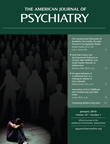Remission of Persistent Methamphetamine-Induced Psychosis After Electroconvulsive Therapy: Presentation of a Case and Review of the Literature
Abstract
Abstract
Illicit methamphetamine abuse represents a major problem in many countries worldwide, including the United States. Prolonged regular smoking or injection of methamphetamine can cause a psychosis, typically characterized by paranoid delusions and auditory hallucinations and often associated with disturbances in mood. These symptoms may persist long after methamphetamine is discontinued and may prove refractory to antipsychotic medications. The authors describe a patient who developed a typical methamphetamine psychosis that persisted despite months of abstinence from methamphetamine and weeks of treatment with antipsychotic medication but that responded promptly to electroconvulsive therapy (ECT) on two separate occasions: on initial presentation and again a year later when the patient relapsed into methamphetamine abuse and developed psychosis again. The authors review the large international literature on methamphetamine psychosis, much of which is from Japan and has not previously been summarized in English. Persistent methamphetamine psychosis has been widely reported in Japan for more than 50 years but is rarely discussed in the American literature, possibly because some such cases are misdiagnosed in the United States as primary psychotic disorders. Given the growing public health problem of methamphetamine abuse in the United States, the distinction between persistent methamphetamine psychosis and a primary psychotic disorder has grown increasingly important. Thus, American clinicians should be alert to the possibility of methamphetamine psychosis and may wish to consider ECT in refractory cases.



